
by Elizabeth Atalay | Feb 18, 2014 | 2014, Environment, International, Millennium Development Goals, Social Good, Uncategorized, United Nations, Water, World Moms Blog, World Voice

In 2000, 189 nations made a promise to free people from extreme poverty and multiple deprivations. This pledge turned into the eight Millennium Development Goals, and was written as the Millennium Goal Declaration .- United Nations Development Programme
The goal of MDG #7 is to ensure environmental sustainability. This month we are thrilled to continue our #Moms4MDG campaign by joining forces with Esquel Foundation in Brazil.
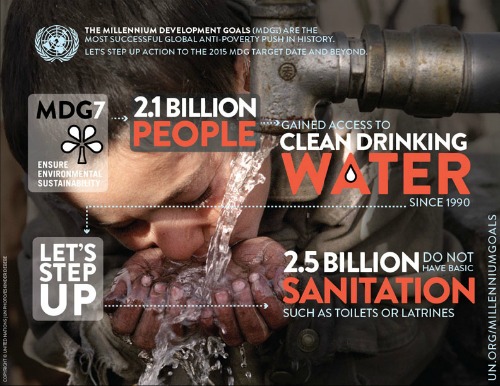
The goals of Millennium Development Goal # 7 are:
- Make sustainable development part of the policies and programs of governments and reverse the loss of environmental resources.
- Reduce and slow down biodiversity loss.
- By 2015 half the proportion of the population without sustainable access to safe drinking water and basic sanitation.
- By 2020, achieve a significant improvement in the lives of at least 100 million people who live in slums.
To tackle MDG # 7 we have partnered with The Esquel Foundation:
The Esquel Group (EG) is a private non-profit organization founded in 1984 and dedicated to stalwart citizenship as the common element in sustainable democracy and sustainable economic development. It is a member of the Grupo Esquel network with associate entities in Argentina, Brazil, Ecuador, Honduras and Uruguay. Its focus is strongly—though not exclusively—Latin American. It receives its support from contracted work and from donations from private, public and multilateral sources.Through seminars, presentations and training programs EG promotes national policies as well as grassroots initiatives dedicated to social inclusion and sustainable development. It fosters inquiry and action towards self governance and greater citizen engagement in public life, particularly at the local level. EG organizes a periodic policy seminar in Washington DC and conducts training on social entrepreneurship for community development, with particular focus on practices for strengthening the structure and functions of civil society networks, deliberative democracy and conflict management skills.- www.esquel.org
Meet us over at the Esquel Group blog today to read the guest post by World Moms Blog contributor Andrea Steiner! You can read her full post, here:
We will be co-hosting our#Moms4MDGs Twitter Party with Esquel Foundation, Girls Globe, and Multicultural Kid Blogs tomorrow, February 19th from 1-2pm EST to talk environment, so please join us!
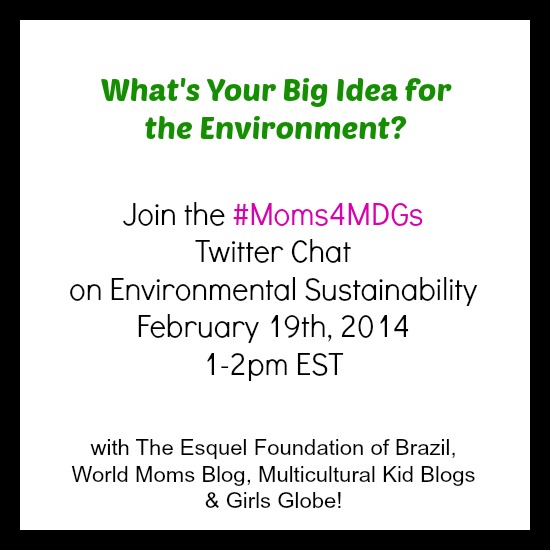
P.S. Never been to a twitter party before? Go to www.tweetchat.com and put in the hashtag: “#Moms4MDGs during the party times. From there you can retweet and tweet, and the hashtag will automatically be added to your tweets. You can view all of the other party tweets at that hashtag as well!
This is an original post to World Moms Blog by World Voice Editor, Elizabeth Atalay of Documama in Rhode Island, USA.

Elizabeth Atalay is a Digital Media Producer, Managing Editor at World Moms Network, and a Social Media Manager. She was a 2015 United Nations Foundation Social Good Fellow, and traveled to Ethiopia as an International Reporting Project New Media Fellow to report on newborn health in 2014. On her personal blog, Documama.org, she uses digital media as a new medium for her background as a documentarian. After having worked on Feature Films and Television series for FOX, NBC, MGM, Columbia Pictures, Warner Brothers, 20th Century Fox, and Castle Rock Pictures, she studied documentary filmmaking and anthropology earning a Masters degree in Media Studies from The New School in New York. Since becoming a Digital Media Producer she has worked on social media campaigns for non-profits such as Save The Children, WaterAid, ONE.org, UNICEF, United Nations Foundation, Edesia, World Pulse, American Heart Association, and The Gates Foundation. Her writing has also been featured on ONE.org, Johnson & Johnson’s BabyCenter.com, EnoughProject.org, GaviAlliance.org, and Worldmomsnetwork.com. Elizabeth has traveled to 70 countries around the world, most recently to Haiti with Artisan Business Network to visit artisans in partnership with Macy’s Heart of Haiti line, which provides sustainable income to Haitian artisans. Elizabeth lives in New England with her husband and four children.
More Posts

by Elizabeth Atalay | Jan 14, 2014 | 2014, AIDS, Health, Humanitarian, Malaria, Millennium Development Goals, Social Good, Vaccines, World Moms Blog, World Voice

In 2000, 189 nations made a promise to free people from extreme poverty and multiple deprivations. This pledge turned into the eight Millennium Development Goals, and was written as the Millennium Goal Declaration .- United Nations Development Programme
The goals of MDG #6 are to combat HIV/AIDS, Malaria, and Other Diseases. This month we are thrilled to continue our #Moms4MDG campaign by joining forces with The Bill & Melinda Gates Foundation to take on the topic of preventable infectious diseases.
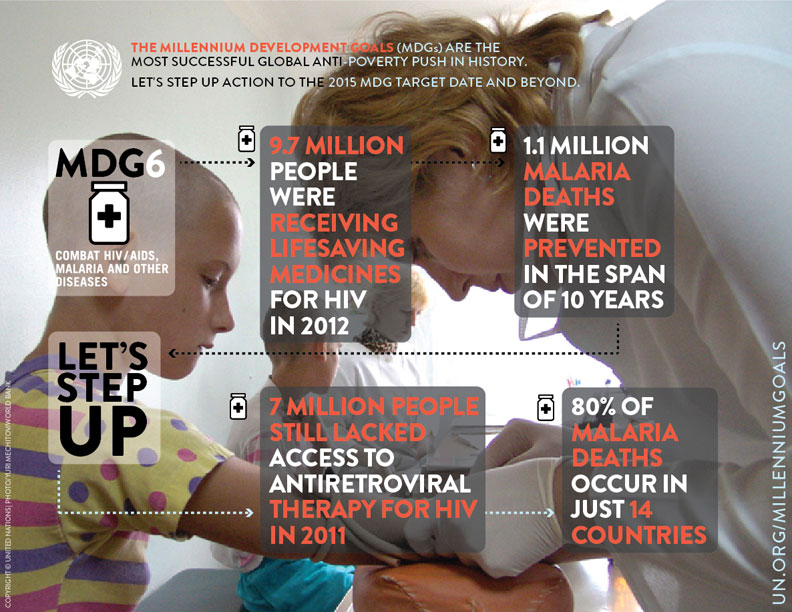
The goals of Millennium Development Goal # 6 are:
- A. To Have halted by 2015 and begun to reverse the spread of HIV/AIDS
- B. By 2010, to have achieved universal access to treatment for HIV/AIDS for all those who need it
- C. To have halted by 2015 and begun to reverse the incidence of malaria and other major diseases
The Bill & Melinda Gates Foundation works tirelessly to support research, solutions and implementation towards improving global health.
Guided by the belief that every life has equal value, the Bill & Melinda Gates Foundation works to help all people lead healthy, productive lives. In developing countries, it focuses on improving people’s health and giving them the chance to lift themselves out of hunger and extreme poverty. In the United States, it seeks to ensure that all people—especially those with the fewest resources—have access to the opportunities they need to succeed in school and life.-www.gatesfoundation.org
Meet us over at the Bill & Melinda Gates Foundation blog Impatient Optimists today to read the guest post by World Moms Blog contributor Erin Threlfall!
We will be co-hosting two #Moms4MDGs Twitter Parties with The Gates Foundation, Multicultural Kid Blogs, InCulture Parent and Girls Globe tomorrow, January 15th at 1-2pm EST and 9-10pm EST, so please join us!
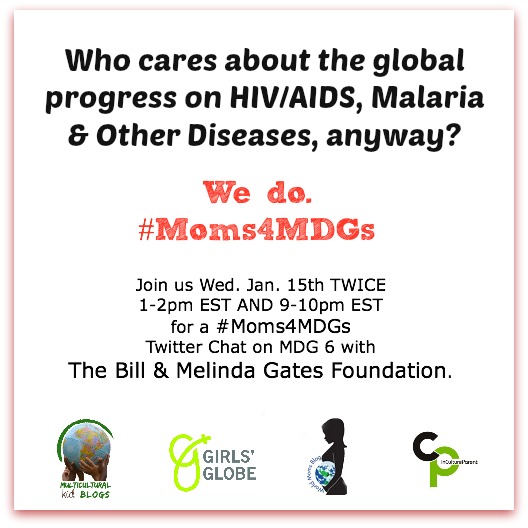
A big THANK YOU, to three amazing sites, Multicultural Kid Blogs, InCulture Parent and Girls Globe for joining us in the rally towards the UN’s Development Goals this month with The Bill and Melinda Gates Foundation!
P.S. Never been to a twitter party before? Go to www.tweetchat.com and put in the hashtag: “#Moms4MDGs during the party times. From there you can retweet and tweet, and the hashtag will automatically be added to your tweets. You can view all of the other party tweets at that hashtag as well!
This is an original post to World Moms Blog by World Voice Editor, Elizabeth Atalay of Documama in Rhode Island, USA.

Elizabeth Atalay is a Digital Media Producer, Managing Editor at World Moms Network, and a Social Media Manager. She was a 2015 United Nations Foundation Social Good Fellow, and traveled to Ethiopia as an International Reporting Project New Media Fellow to report on newborn health in 2014. On her personal blog, Documama.org, she uses digital media as a new medium for her background as a documentarian. After having worked on Feature Films and Television series for FOX, NBC, MGM, Columbia Pictures, Warner Brothers, 20th Century Fox, and Castle Rock Pictures, she studied documentary filmmaking and anthropology earning a Masters degree in Media Studies from The New School in New York. Since becoming a Digital Media Producer she has worked on social media campaigns for non-profits such as Save The Children, WaterAid, ONE.org, UNICEF, United Nations Foundation, Edesia, World Pulse, American Heart Association, and The Gates Foundation. Her writing has also been featured on ONE.org, Johnson & Johnson’s BabyCenter.com, EnoughProject.org, GaviAlliance.org, and Worldmomsnetwork.com. Elizabeth has traveled to 70 countries around the world, most recently to Haiti with Artisan Business Network to visit artisans in partnership with Macy’s Heart of Haiti line, which provides sustainable income to Haitian artisans. Elizabeth lives in New England with her husband and four children.
More Posts
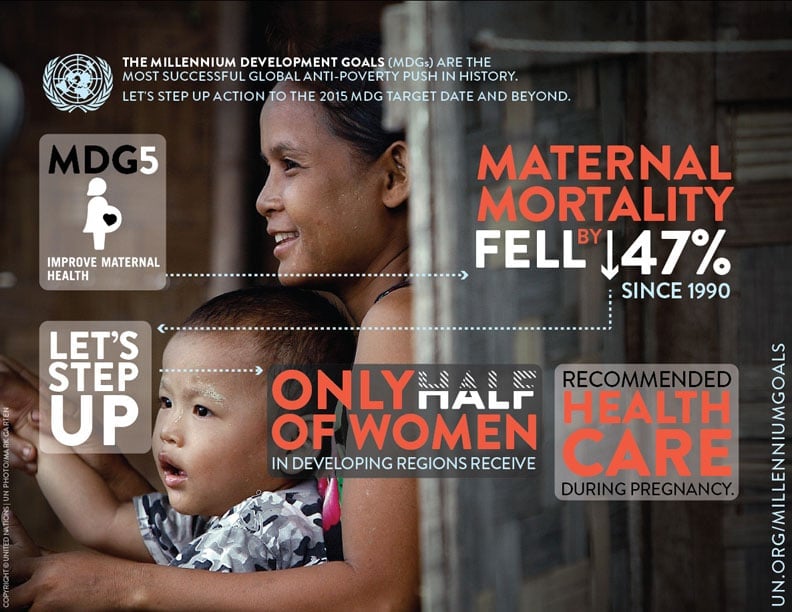
by Elizabeth Atalay | Dec 17, 2013 | 2013, Babies, Birthing, Clean Birth Kits, Girls, Health, Hospital, Humanitarian, Maternal Health, Motherhood, Pregnancy, Social Good, World Moms Blog, World Voice

In 2000, 189 nations made a promise to free people from extreme poverty and multiple deprivations. This pledge turned into the eight Millennium Development Goals, and was written as the Millennium Goal Declaration .- United Nations Development Programme

MDG #5 is to Improve Maternal Health and we are excited to continue our #Moms4MDG campaign this month by joining forces with Every Mother Counts.
Every Mother Counts is an organization founded by Christy Turlington Burns after her own frightening experience during childbirth. Christy became aware that her scenario could have been fatal, as it is for many women globally, without access to the quality healthcare she had been provided. Every year hundreds of thousands of women die during or due to childbirth, mostly from preventable causes. Every Mother Counts works to reach the goal that no mother should have to give her life while giving birth to another. Tomorrow, in conjunction with our Twitter Parties, World Moms Blog contributor Dee Harlow in Laos features a post on the Every Mother Counts Blog about Maternal Health.
We hope you will also join us tomorrow , December 18th, for our #Moms4MDGs Twitter party to discuss Maternal Health with @everymomcounts at 1:00 EST, and at 9:00 pm EST. See you there!
P.S. Never been to a twitter party before? Go to www.tweetchat.com and put in the hashtag: “#Moms4MDGs during the party times. From there you can retweet and tweet and the hashtag will automatically be added to your tweets. And, from there you can also view all of the party tweets!
This is an original post to World Moms Blog by World Voice Editor, Elizabeth Atalay of Documama in Rhode Island, USA.

Elizabeth Atalay is a Digital Media Producer, Managing Editor at World Moms Network, and a Social Media Manager. She was a 2015 United Nations Foundation Social Good Fellow, and traveled to Ethiopia as an International Reporting Project New Media Fellow to report on newborn health in 2014. On her personal blog, Documama.org, she uses digital media as a new medium for her background as a documentarian. After having worked on Feature Films and Television series for FOX, NBC, MGM, Columbia Pictures, Warner Brothers, 20th Century Fox, and Castle Rock Pictures, she studied documentary filmmaking and anthropology earning a Masters degree in Media Studies from The New School in New York. Since becoming a Digital Media Producer she has worked on social media campaigns for non-profits such as Save The Children, WaterAid, ONE.org, UNICEF, United Nations Foundation, Edesia, World Pulse, American Heart Association, and The Gates Foundation. Her writing has also been featured on ONE.org, Johnson & Johnson’s BabyCenter.com, EnoughProject.org, GaviAlliance.org, and Worldmomsnetwork.com. Elizabeth has traveled to 70 countries around the world, most recently to Haiti with Artisan Business Network to visit artisans in partnership with Macy’s Heart of Haiti line, which provides sustainable income to Haitian artisans. Elizabeth lives in New England with her husband and four children.
More Posts

by Elizabeth Atalay | Nov 26, 2013 | 2013, Africa, AIDS, Health, ONE, World Events, World Moms Blog
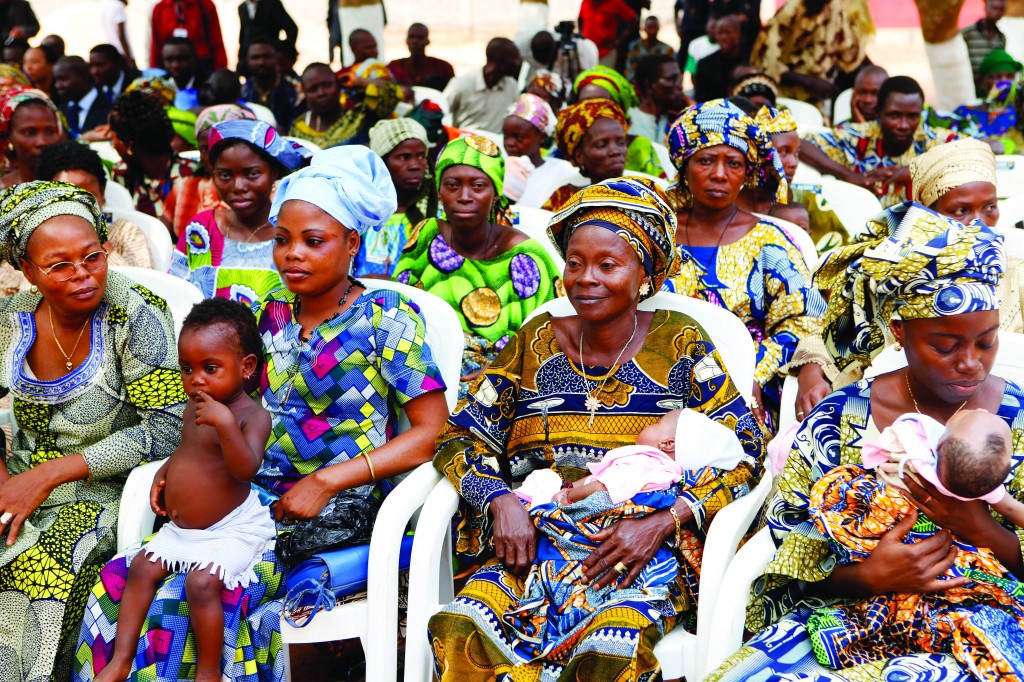
A community meeting of HIV-positive women who have benefitted from prevention of mother-to-child transmission (PMTCT) services and health counselors in Dangbo, Benin. Through the expanding availability of these services, it is now possible to imagine a generation of children being born free from HIV.- photo credit The Global Fund
Optimistic news was released today in the annual accountability report on AIDS by ONE. The highlight is that the sweeping statement “AIDS in Africa” has now become obsolete. African countries are shown in this new report to have made such widely varied progress in the fight against AIDS that the generalization of the continent as a whole no longer makes sense. At this point there are 16 countries in Sub-Saharan Africa that have reached the tipping point of being at the beginning of the end of AIDS. At the same time, other countries are still far behind in the struggle against the disease.
On the 25th World AIDS Day marked on December 1st of 2013, ONE’s new report on the global AIDS fight shows we are closing in on the tipping point.
According to ONE’s 2013 analysis: If current rates of acceleration continue, we could achieve the beginning of the end of AIDS – when the number of people newly added to treatment surpasses the number newly infected with HIV by 2015
Ironically, the AIDS fight has lost some political momentum because of its many successes. Because it is no longer perceived as a global health emergency, but rather a chronic and manageable disease, the fight has lost some of its political momentum. Along with the financial commitment, political leadership at the national and local levels has proved to be essential in driving real gains across the continent.
The three key targets outlined in the report where world leaders should focus significant attention in order to make headway against the disease are:
- The virtual elimination of mother-to-child transmission of HIV by 2015
- Access to treatment for 15 million HIV-positive individuals by 2015
- The drastic reduction of new adult and adolescent HIV infections, to approximately 1.1 million or fewer annually, by 2015.
The data in the assessment breaks down the progress of nine African countries and where they stand in meeting the 2015 goals:
leading the Way: Ghana, Malawi and Zambia are great examples of how international donors, national governments and key civil society leaders can work together to achieve accelerated progress in the fight against AIDS. Zambia and Malawi entered the decade with two of the world’s most widespread, crippling AIDS epidemics. Today, they – along with Ghana – are the world’s leaders in ending the epidemic, having made swift and steady progress over the last few years. All three countries have committed significant national resources for health, have reached and surpassed the tipping point at the country level, and are making even further headway towards the control and defeat of the disease.
ones to Watch: South Africa, Tanzania and Uganda have shown real dynamism but erratic progress as they face massive disease burdens, shifting political landscapes and unique, country-specific challenges. These countries have made significant strides in recent years, but their progress has been slower than in the leading countries. South Africa and Tanzania hit the tipping point for the beginning of the end of AIDS for the first time just last year, and Uganda – with an AIDS ratio of 1.1 – is close to the tipping point but has yet to reach it. Given unsteady progress against the AIDS epidemic in recent years, how these countries move forward in the next 1–2 years will be crucial.
Urgent Progress needed: Cameroon, Nigeria and Togo have not made enough progress, having often been hampered by a lack of political will or competing political priorities, insufficient financial commitments, inefficient delivery systems and a lack of specific attention to prevention. Togo, in particular, had reached the AIDS tipping point in 2010 but has slipped back since. Meanwhile, progress towards the beginning of the end of AIDS has been largely stagnant in Nigeria and Cameroon, albeit with dramatic year-to-year fluctuations in the AIDS ratio. These countries, and others like them, must show a serious acceleration of efforts to achieve the beginning of the end of AIDS by 2015.
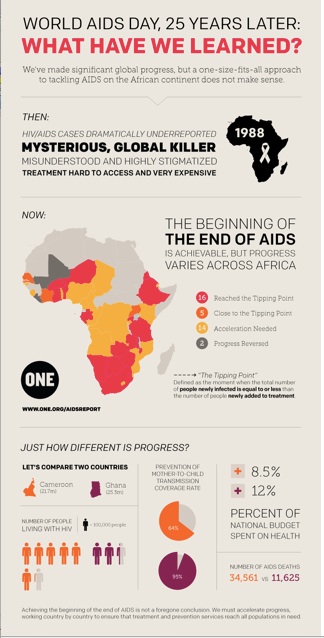
Despite the overall positive progress made in the fight against AIDS the momentum needs to continue to win. Prevention of new infections is key, transparency in reporting, political involvement, targeted resources, and keeping the AIDS issue in the forefront of the global agenda are all critical to the success of this campaign.
This is a big week for the AIDS community, with a hugely successful (RED) auction this past Saturday night, the 25thWorld AIDS Day, and the Global Fund replenishment. The (RED) auction on Saturday raised $13 million which was matched by Bill and Melinda Gates for a total $26 million for the Global Fund. Let’s keep the momentum going!
To learn more you can read the full report
here.
About ONE
Co-founded by Bono, ONE is a campaigning and advocacy organization of more than three million people taking action to end extreme poverty and preventable disease… because the facts show extreme poverty has already been cut in half and can be virtually eradicated by 2030.
ONE does not ask for your money, but for your voice.
Find out more at ONE.org
This is an original World Moms Blog post written by Elizabeth Atalay of www.documama.org. All information comes from The Beginning of The End? Tracking Global Commitments On AIDS Volume 2 ONE Data Report.
- A community meeting of HIV-positive women who have benefitted from prevention of mother-to-child transmission (PMTCT) services and health counselors in Dangbo, Benin. Through the expanding availability of these services, it is now possible to imagine a generation of children being born free from HIV.- photo courtesy of ONE.org

Elizabeth Atalay is a Digital Media Producer, Managing Editor at World Moms Network, and a Social Media Manager. She was a 2015 United Nations Foundation Social Good Fellow, and traveled to Ethiopia as an International Reporting Project New Media Fellow to report on newborn health in 2014. On her personal blog, Documama.org, she uses digital media as a new medium for her background as a documentarian. After having worked on Feature Films and Television series for FOX, NBC, MGM, Columbia Pictures, Warner Brothers, 20th Century Fox, and Castle Rock Pictures, she studied documentary filmmaking and anthropology earning a Masters degree in Media Studies from The New School in New York. Since becoming a Digital Media Producer she has worked on social media campaigns for non-profits such as Save The Children, WaterAid, ONE.org, UNICEF, United Nations Foundation, Edesia, World Pulse, American Heart Association, and The Gates Foundation. Her writing has also been featured on ONE.org, Johnson & Johnson’s BabyCenter.com, EnoughProject.org, GaviAlliance.org, and Worldmomsnetwork.com. Elizabeth has traveled to 70 countries around the world, most recently to Haiti with Artisan Business Network to visit artisans in partnership with Macy’s Heart of Haiti line, which provides sustainable income to Haitian artisans. Elizabeth lives in New England with her husband and four children.
More Posts

by Elizabeth Atalay | Nov 6, 2013 | 2013, Africa, Education, Social Good, World Moms Blog, World Voice, Younger Children
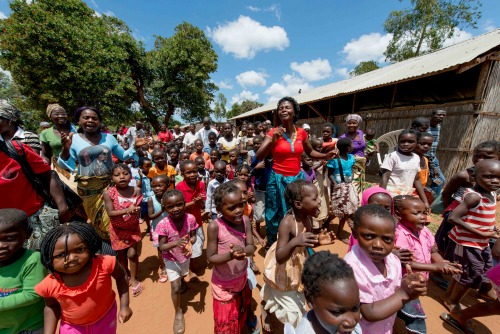
Singing and dancing is the order of the day as this procession of Save the Children preschool graduates, teachers and community members in Mozambique’s Gaza Province makes its way across the school ground to the nearby primary school, where the little graduates will be studying next year. Photo credit: Pei Ketron for Save the Children. October 2013.
In a newly published preschool programs are described as a promising policy option for improving the school readiness and later success of poor and disadvantaged children in rural Africa.
Tonight at 9pm EST World Moms Blog will join Save The Children and Multicultural Kid Blogs at #Moms4MDGs to discuss the importance of early education, and as a specific example, the success of the Save The Children preschool program in Mozambique. Ajla Grozdanic of Save The Children recently returned from a site visit to Mozambique and the early education programs there. She shared her insight in an interview with World Moms Blog as a lead up to tonights Twitter party:
World Moms Blog: In a Chicken & Egg sense, are early education programs only able to be initiated in areas where some basic infrastructure is already in place, i.e. access to clean water, healthcare & nutrition, or are they catalysts for communities to begin to pull out of extreme poverty?
AG: We are able to initiate education programs in communities at any level. In other words, having a basic infrastructure in place is not a pre-requisite for education programs, which can range from in-home daycare to in-school programs.
In fact, early childhood education can bring catalytic change for communities. Early childhood development centers and programs provide an opportunity to reach young children with basic services like healthcare and nutrition, which can be more difficult to deliver if we depended on parents to seek out these services on their own. Early childhood development centers also facilitate community mobilization, bringing parents and other community members together for projects, such as digging wells or cleaning stagnant water that hosts malaria.
Young children naturally learn from and imitate what’s in their environment–good or bad. For this reason, educating young children is key and it fosters the kinds of attitudes and behavior that can improve community well-being over the long term, such as developing good hygiene and healthy eating habits and sharing this knowledge with siblings and neighborhood children.
WMB: Could you explain a bit why Mozambique was a good fit for this program? What is the success rate for other similar early education programs Save the Children runs in other countries?
AG: Mozambique had very low coverage for preschool or early childhood development programs, so the need and demand was high. It’s also important to note that the local communities demonstrated an openness and eagerness to engage in these issues. Communities saw the potential and agreed to invest in their young children. Once they saw the results, which were very good, the word spread and the demand grew.
The World Bank Study, which is the first such evaluation of early childhood development programs in Africa, showed that children in rural Mozambique, who attended Save the Children’s preschool programs, were 24 percent more likely to enroll in primary school and were significantly better equipped to learn than children not covered by the program. While we haven’t had the funding to conduct similar studies in other countries where we offer such programs, our own results monitoring shows a similar success rate across the board.
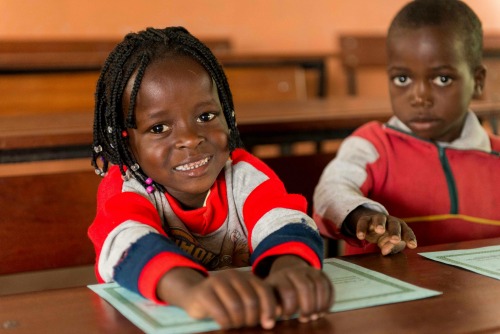
Save the Children preschool graduate, Vania, 5, from the Gaza Province in Mozambique, joined by a future classmate, gets a taste of what it will be like to sit at a real desk when she enters primary school next year. Preschoolers in her village are used to sitting on mats on the floor and were excited to sit in ‘big-kid’ chairs and desks at the nearby primary school. Photo credit: Pei Ketron for Save the Children. October 2013.
WMB: Do you see the benefits in terms of kids who have had these early intervention programs staying in school longer, and particularly for girls, marrying later or are these programs too new to tell yet?
AG: Children enrolled in preschool have a greater chance of going to school, going to school at the right age, and staying in school longer. They have higher graduation rates and are less likely to drop out of school or end up imprisoned. What’s more, staying in school is a mechanism to protect girls from early marriage. While it’s still too early to prove long-term benefits of preschool, such as that it results in girls marrying later in life, we hope to conduct such longitudinal studies in the future.
WMB: Are the children given meals through the program as an incentive for parents to send them or are the community members generally open and willing participants?
AG: It is usually not sustainable to provide meals to all children who are enrolled in preschool. Taking this into account, in most communities preschool lasts for half the school day so children can come home for meals. In some communities, parents might pool their resources in order to provide meals at preschools. In addition, preschools provide an opportunity to educate parents on how to improve nutrition for their child.
The willingness of parents to enroll their children in preschool varies from parent to parent and from community to community. Oftentimes, we’ll have a group of early adopters who are eager to enroll their children and whose success, in turn, inspires a wave of other parents–who prefer a stand-back, wait-and-see approach–to sign up their little ones.
WMB: Had you been to Mozambique before?
AG: No, this was my first time.
WMB: What is the best way people reading could support the Save the Children preschool programs in the developing world?
AG: Your readers could become a sponsor to support early childhood programs in developing countries. They could also advocate to the U.S. government to include preschool and early childhood development in its international aid programs. To learn more, visit www.savethechildren.org.
WMB: How have the mothers responded to these programs? (ie. gives them the opportunity to go to work or tend to smaller children)
AG: We encourage the participation of both mothers and fathers in their children’s education. Sending their children to preschool allows parents to tend to their daily chores, work in the field or otherwise provide for their family while knowing that their children are in good hands and are learning, to boot. In traditional societies, where childcare falls on women, preschools certainly offer an opportunity for women to engage in more productive labor and earn an additional income for their family. And we know from experience that when women earn more income for their families, they tend to invested in their children.
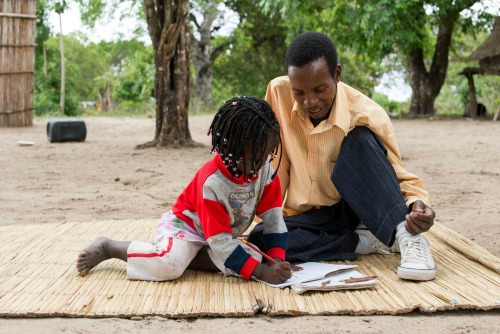
Vania, 5, practices the alphabet and counting every day with her father, Armando, who is a teacher at his daughter’s preschool, which is supported by Save the Children. Photo credit: Pei Ketron for Save the Children. October 2013.
This is an original interview and post for World Moms Blog.
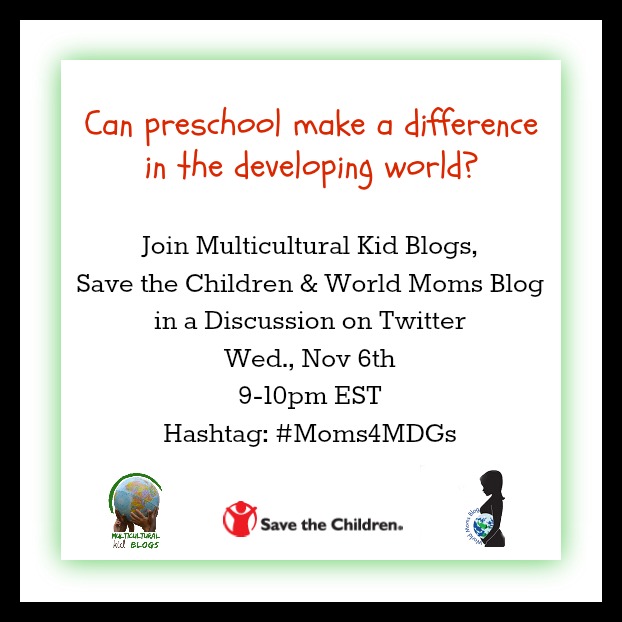

Elizabeth Atalay is a Digital Media Producer, Managing Editor at World Moms Network, and a Social Media Manager. She was a 2015 United Nations Foundation Social Good Fellow, and traveled to Ethiopia as an International Reporting Project New Media Fellow to report on newborn health in 2014. On her personal blog, Documama.org, she uses digital media as a new medium for her background as a documentarian. After having worked on Feature Films and Television series for FOX, NBC, MGM, Columbia Pictures, Warner Brothers, 20th Century Fox, and Castle Rock Pictures, she studied documentary filmmaking and anthropology earning a Masters degree in Media Studies from The New School in New York. Since becoming a Digital Media Producer she has worked on social media campaigns for non-profits such as Save The Children, WaterAid, ONE.org, UNICEF, United Nations Foundation, Edesia, World Pulse, American Heart Association, and The Gates Foundation. Her writing has also been featured on ONE.org, Johnson & Johnson’s BabyCenter.com, EnoughProject.org, GaviAlliance.org, and Worldmomsnetwork.com. Elizabeth has traveled to 70 countries around the world, most recently to Haiti with Artisan Business Network to visit artisans in partnership with Macy’s Heart of Haiti line, which provides sustainable income to Haitian artisans. Elizabeth lives in New England with her husband and four children.
More Posts





















